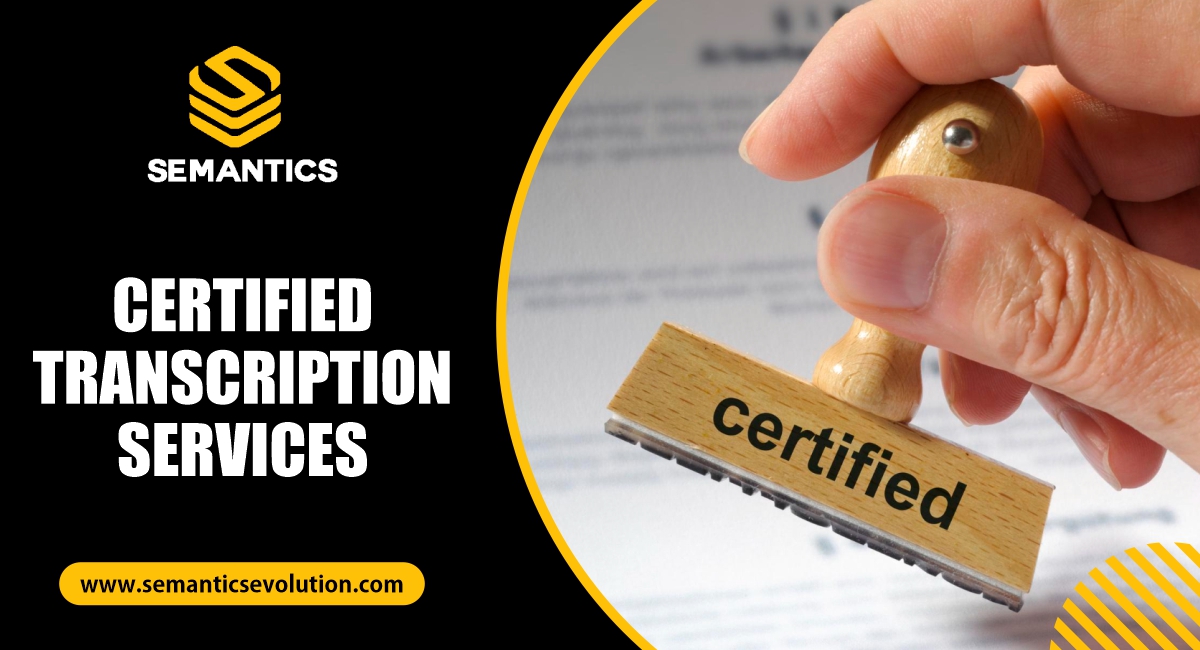When dealing with court-ordered documents, the stakes are high. Every word counts and any misstep can compromise a case. One of the most crucial aspects of legal proceedings is ensuring that spoken words are accurately captured and transcribed into written form. But it’s not just about taking notes or transcribing a conversation—it’s about ensuring every nuance is recorded exactly as it occurred, without distortion. This is where certified transcription services come into play.
In a legal context, certified transcription offers a level of authenticity and accountability that ordinary transcription simply cannot. The certification process provides an official verification that the transcribed text is a true and accurate reflection of the original audio or video. For court-ordered documents, this means that what’s written can be confidently used as evidence, ensuring that the integrity of the legal process is upheld.
So, what does this mean for you? If you’re handling legal matters that involve court-ordered documents, relying on certified transcription services can drastically reduce the risk of errors or misinterpretations that could hurt your case. These services ensure your documents meet the strictest standards and comply with legal requirements—helping you avoid costly delays and ensuring procedural accuracy.
At Semantics, we understand the intricacies of legal transcription. With over 5,000 native language experts and ISO 9001 & 27001 certifications, we specialize in delivering reliable, certified transcription services that you can trust—no matter the language or legal complexity.
Stick with us as we explore five essential ways certified transcription services make a real difference in handling court-ordered documents—improving outcomes, ensuring compliance, and ultimately providing you peace of mind.
-
Ensuring Legal Admissibility of Evidence
For a document to be accepted as evidence, it must meet strict legal standards. Certified transcriptions provide a legally recognized version of audio or video evidence, complete with certification statements verifying their accuracy. Expert transcriptionists follow rigorous protocols to maintain the chain of custody and handle sensitive data securely.
In addition, these certified documents often include court-approved timestamps, professional credentials, and unique identifiers. This level of detail makes it difficult for opposing parties to challenge the evidence on procedural grounds, strengthening its credibility in legal proceedings.
-
Enhancing Accessibility and Review Efficiency
Legal professionals need quick and easy access to case-related information. Unlike audio or video recordings, certified transcripts offer:
- Instant searchability to locate key statements or testimony
- The ability to highlight and annotate important details
- Easy sharing among legal teams, clients, and expert witnesses
- Improved accessibility for hearing-impaired individuals
- Simplified citation in legal briefs and motions
With certified transcriptions, attorneys can efficiently reference critical evidence, develop stronger arguments, and streamline case preparation.
-
Preserving Context and Nuance
Legal cases often hinge on precise wording, tone, and context. Professional transcriptionists capture essential details such as speaker identification, emotional inflections, pauses, and interruptions—elements that standard recordings may not fully convey.
By including notations for unclear speech or background noise, certified transcriptions ensure that every detail is accurately documented. This meticulous attention to nuance eliminates misinterpretations, providing a clear, reliable record that reflects the original conversation exactly as it occurred.
-
Supporting Multi-Language Legal Proceedings
In multilingual court cases, language barriers can create challenges in understanding testimony and evidence. Certified transcription services bridge these gaps by providing precise transcriptions along with accurate translations.
This dual-language approach ensures that:
- Original statements are preserved without distortion
- Legal teams and judges can fully comprehend the testimony
- Proceedings remain fair and inclusive for non-native speakers
For international legal matters, this level of linguistic accuracy is critical in maintaining the integrity of court-ordered documents.
-
Strengthening Appeals and Future Case References
When cases move to appellate courts, accurate records of lower court proceedings are essential. Certified transcriptions serve as definitive legal records, providing judges and attorneys with reliable documentation of previous testimony, rulings, and arguments.
Unlike audio recordings, which may degrade over time or become outdated due to technological advancements, written transcripts remain permanently accessible. Their evidentiary value endures, ensuring that legal professionals can reference them for decades when cases set legal precedents or require future review.
Bottom Line
From evidence collection to appeals, certified transcription services play a vital role in the legal process. They enhance accuracy, efficiency, and compliance, making them indispensable tools in court proceedings.
At Semantics, we take legal transcription seriously. With a team of language specialists and globally recognized certifications, we guarantee transcription services that meet the highest legal standards. Our commitment to precision ensures that court-ordered documents retain their integrity, supporting the pursuit of justice at every stage.
FAQs
What makes a transcription “certified” for court use?
A certified transcription includes a signed statement from a qualified transcriptionist, verifying that the document is an accurate and complete representation of the original recording, meeting legal admissibility standards.
How fast can I get a certified transcription for an urgent case?
Expedited services typically deliver certified transcriptions within 24 to 48 hours. Rush options are available for urgent cases, sometimes completing in just a few hours.
Are digital recordings better for legal transcription than analog tapes?
Yes, digital recordings generally produce clearer transcriptions due to superior sound quality, though professional transcriptionists can work with both formats.
Can a certified transcriptionist testify in court?
Yes, if a transcript is challenged, the transcriptionist can testify to confirm its accuracy and the methods used in its creation.
How do courts handle transcriptions of poor-quality recordings?
When audio quality is poor, transcriptionists note unintelligible sections and provide timestamps. Courts accept these professional notations as standard practice rather than allowing speculative interpretations.





